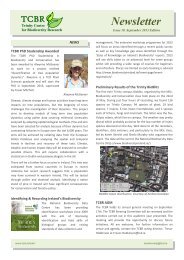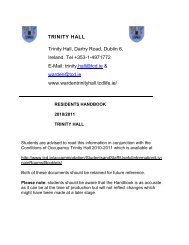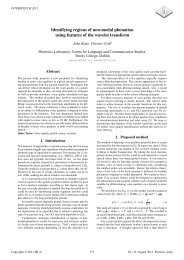Globalization and Inequality - Trinity College Dublin
Globalization and Inequality - Trinity College Dublin
Globalization and Inequality - Trinity College Dublin
Create successful ePaper yourself
Turn your PDF publications into a flip-book with our unique Google optimized e-Paper software.
manufacturing prices has the expected negative effect on wage-rental ratios for five of the seven<br />
countries, the exceptions being Australia <strong>and</strong> Denmark. It appears that CMI was important in<br />
driving factor price convergence during this period.<br />
Moreover, other dimensions of globalization also contributed to the wage-rental<br />
convergence; in particular, migration increased wage-rental ratios in Europe <strong>and</strong> lowered them in<br />
the New World. However, international capital flows were probably a force for divergence during<br />
this period, rather than convergence, in that capital flowed from low-wage Europe to the high-wage<br />
New World, exacerbating rather than moderating wage-rental ratio differences.<br />
Factor Price Convergence <strong>and</strong> <strong>Inequality</strong> in the Late 19 th Century<br />
What were the implications of these factor price movements for inequality? To a large<br />
extent, this depended on who owned the l<strong>and</strong>. Typically, l<strong>and</strong>owners were at the top of the income<br />
distribution, <strong>and</strong> so the globalization forces which raised wage-rental ratios in Europe should have<br />
made Europe more equal; while the same forces which lowered wage-rental ratios in the New<br />
World should have made those societies more unequal. Presumably the inequality impact was<br />
greater where l<strong>and</strong>-holding was more concentrated, such as Latin America, than in societies where<br />
the family farm predominated, such as the northern United States, or Burma. Meanwhile,<br />
intercontinental migrants were typically unskilled; thus, immigration would have lowered unskilled<br />
wages <strong>and</strong> raised inequality in the New World, but raised unskilled wages <strong>and</strong> lowered inequality in<br />
Europe. Broadly speaking, globalization should have made the relatively poor Old World more<br />
equal, but at the expense of higher inequality in the affluent New World– precisely the same<br />
correlation as Heckscher-Ohlin thinking would predict today.<br />
22
















